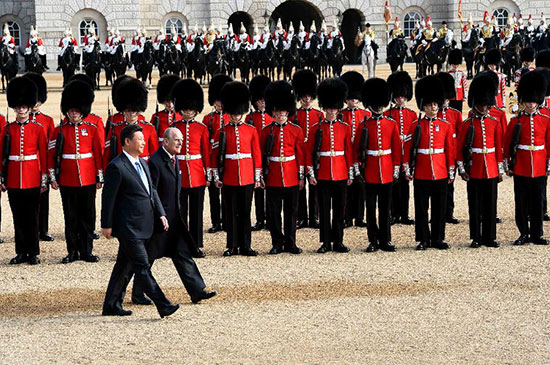

 |
| Chinese President Xi Jinping, accompanied by Prince Philip, inspects the guard of honor during a traditional ceremonial welcome held by British Queen Elizabeth II at the Horse Guards Parade in London, Britain, Oct. 20, 2015. (Xinhua/Rao Aimin) |
Relations between China and Britain have rarely been this intimate.
The red carpet has been rolled out several days in advance to welcome Chinese President Xi Jinping starting from Monday. During the four-day trip, Xi will be greeted with a 103-gun salute, a stay at Buckingham Palace, a state banquet and several high profile banquets, plenty of personal time with Queen Elizabeth II, and all accompanied by British Prime Minister David Cameron.
Xi and his wife, Peng Liyuan, will join the Queen and the Duke of Edinburgh for a state carriage procession.
"Symbolically, it is important, because it will mark an era of greater dynamism and higher profile within the UK for the importance of the relationship with China," Kerry Brown, director of the China Studies Center and professor of Chinese Politics at the University of Sydney, told the Global Times.
A unique British greeting
"We are very honored that Xi and Peng came to the UK and the UK only, not part of a wider tour," Hugo Swire, UK minister of state for Asia, told the Global Times.
"Beijing has rewarded Chancellor George Osborne's persistence," Robin Niblett, director of UK world affairs think tank Chatham House, wrote in a paper published Monday.
George Osborne promised during his visit to China that Britain will be Beijing's "best partner in the West." Osborne has endeavored to give the UK-China policy consistent political attention and link it to domestic issues in the UK.
"It's going to be very successful. The signs are more encouraging than from Xi's visit to the US. The British government is making very strong moves to create a new kind of relationship with China," Martin Jacques, a senior fellow at the Department of Politics and International Studies, Cambridge University and the author of the global best-seller When China Rules the World, told the Global Times.
"The UK has lived too long in the shadow of its colonial past with China, and it now has a chance to step out of this and create a properly modern, balanced and healthy relationship."
A Honeymoon trip for ‘golden era’
Cameron greeted Xi's visit as the start of a "golden era" for British and Chinese relations. In return, Xi welcomed the British government's advances as the "Western country that is most open to China" as a "visionary and strategic choice."
The last two years has seen the UK surpass the Netherlands to become the second largest trading partner in the EU with China, and the UK is also the biggest recipient of inward investment from China in the EU.
During Xi's trips, some serious deals are likely to be announced. Significant agreements are expected on Chinese investment in UK infrastructure as well as opportunities for British companies to seek business in the growing Chinese market.
Nuclear power and high-speed rails are likely to be the subjects of Chinese investment.
Brown argued that the UK's reputation for being a stable and mature financial market, combined with China's need for investment opportunities, meant that the two complemented each other well.
"So the opportunity to now take things to a different level is imminent. This visit will be the start of that," he said.
A key enabler for economic growth
The honeymoon mood between China and the UK has drawn criticism of Britain's "constant accommodation" of China's economic might, and some even believe that it will unsettle the "special relationship" with the US.
But proponents of the relationship argue that the goal of China-UK cooperation is in the best interests of people in both countries.
They say that the UK can enjoy its primary security relationship with the US, and a strong and increasingly important economic relationship with China.
"The UK sees China as key enabler for economic growth," Niblett said, adding that a healthy China economy will boost the global economy, which will also benefit the US.
Brown suggested that Britain has to strategically identify the areas where it will need to act more unilaterally over China, like it did in early 2015 when the decision was made to join the AIIB. "The UK will need to balance its economic self-interest with its security priorities," he added.
Global Times - People’s Daily
 Photos of beautiful teacher hit the Internet
Photos of beautiful teacher hit the Internet Transparent Over-cliff Path Cracked Suddenly, Causing Panic among Tourists
Transparent Over-cliff Path Cracked Suddenly, Causing Panic among Tourists Bride-to-be tries to save drowned man while taking wedding photos
Bride-to-be tries to save drowned man while taking wedding photos Models change clothes on street in Hangzhou
Models change clothes on street in Hangzhou Night life in Qingdao
Night life in Qingdao In pics: army beauties across world
In pics: army beauties across world Winding mountain road
Winding mountain road
 Math teacher makes 'solar powered electric car'
Math teacher makes 'solar powered electric car' Heavy traffic turns expressway into huge parking lot
Heavy traffic turns expressway into huge parking lot Top 20 hottest women in the world in 2014
Top 20 hottest women in the world in 2014 Top 10 hardest languages to learn
Top 10 hardest languages to learn 10 Chinese female stars with most beautiful faces
10 Chinese female stars with most beautiful faces China’s Top 10 Unique Bridges, Highways and Roads
China’s Top 10 Unique Bridges, Highways and RoadsDay|Week